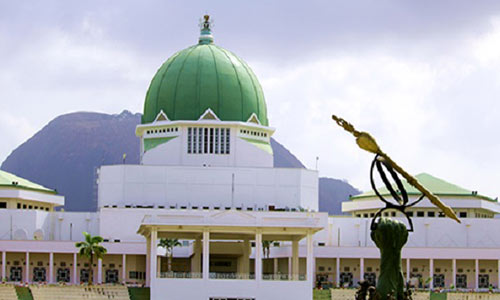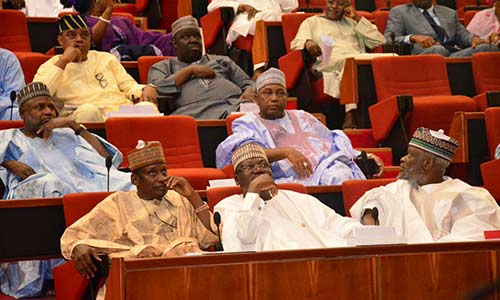National Assembly To Amend Finance Act Over Drafting Errors

Senator Ahmad Lawan yesterday directed the Finance Committees of the federal parliament to liaise with the Federal Ministry of Finance with a view to consider an amendment to the recently signed Finance Act 2022 in order to forestall avoidable loss of revenues.
This is just as Lawan also said revenue generating agencies of the federal government were capable of generating and remitting N3 trillion annually to the federation account if efforts were made to cut down on wasteful spendings.
The Senate President stated these at a meeting with the revenue generating agencies of the federal government at the Senate Wing of the National Assembly complex.
The interactive session was, “on the need to improve internally generated revenue of the federal government of Nigeria and Revenue Projections of the Agencies as Contained in the Appropriation Act 2022.”
The Comptroller General of the Nigerian Customs Service (NCS), Col. Hameed Ali (retd.) caused a stir at the meeting when he raised the alarm that the Finance Act passed last month, incapacitated the NCS and other revenue generating agencies apart from the Federal Inland Revenue Service (FIRS) from collecting revenues.
Ali argued: “Section 22 of the Finance Act 2022 seeks to amend the Federal Inland Revenue Service Law Section 68 (1), (2), (3), (4) and (6) by allowing the Act to takes precedent over any other laws with regards to the administration of taxes, assessment, accounting, collection and enforcement of taxes and levies due to the federal government and the federation of Nigeria.
“When the law was signed, it did not state clearly, the extent and scope of the taxes and levies in question. We are aware that the taxes and levies under the responsibilities of the FIRS are income tax, personal income tax, capital gain tax, VAT and so on.
“However, the amendment is so wide and open that we in the Nigerian Customs Service took it that it had hindered our ability to collect levies and other collections.
“Our understanding of the provisions is that all other laws which mandated us to collect are inconsistent with the new Act, then they are voided. This means that the law that mandates us to collect as revenue generating agencies, are voided completely.
“This means that we do not have the responsibilities to collect levies. If we don’t have the responsibilities to collect, what are we going to discuss here.
“It shall be an offence for any person to carry out the functions of administering, assessment, accounting or enforcement of taxes or levies due to the Federal Government of Nigeria unless authorised by the Ministry of Finance with the approval of the National Assembly.
“We have consulted with lawyers and the conclusion is that the Act is confusing and if other revenue generating agencies decided to act on the provisions, they may decide not to collect duties and levies.”
However, the Senate President wondered why the officials of the federal ministry of Finance were not in attendance at the meeting. He said the nation’s apex legislative institution would have no choice but to amend the law to prevent any revenue loss to the federation account.
Lawan said: “I wonder why the Ministry of Finance is not here because we need their intervention now. Their presence here would have provided some clarifications. We took it for granted that since it was an executive bill, that there were some engagements among the agencies of the federal government.
“We also called for public hearing so that we could ex-ray it. You are saying that you don’t have the legal mandate to collect taxes and it is a scary revelation.
“The Senate Committee on Finance and the Ministry of Finance and other agencies would look at the Act. If it is established beyond reasonable doubts that we need to amend it, we will do so without delay.
“It will be the fastest amendment because we need you to collect more monies for the federal government.”
The Chairman, Senate Committee on Finance, Senator Solomon Adeola nevertheless clarified that the section cited by Ali was not targeted at the NCS.
Adeola explained: “What necessitated that singular act was as a result of the issue between the Revenue Mobilisation and Fiscal Commission and the FIRS.
“There were clashes between them from time to time. Some activities of RMFAC were not in tandem with the Act that established it.
“We discovered that the only way that we can make their roles explicit is through the Finance Act concerning the assessment and accounting of taxes.
“We discovered that RMFAC personnel were going to agencies to audit their tax accounts which is not part of their responsibilities based on the law that established RMFAC.
“The only agency saddled with that responsibility is the FIRS. That was what that law tends to address. We are ready to look into it again if other revenue generating agencies believe that it has hindered them from performing their responsibilities and we would amend it accordingly.”
Senate Tasks Federal Agencies to Generate N3trn Revenue in 2022
Meanwhile, Lawan also said revenue generating agencies of the federal government were capable of generating and remitting N3 trillion annually to the federation account if efforts were made to cut down on wasteful spendings.
The Senate President said the purpose of the meeting was to explore means of increasing government revenues.
He said one of such ways was for the National Assembly to be rigid on the drive to increase revenue so as to cut down on the country’s budget deficit and borrowings, as well as prevent wasteful expenditures by agencies of government.
He assured Nigerians that the upper chamber would provide the needed support through legislation to ensure that revenue agencies perform to meet and surpass their targets.
Lawan added: “In 2022, the National Assembly assumed and rightly so, that our government-owned enterprises can generate up to N3 trillion if we are of the mindset that we can achieve that and, of course, ensure that we oversight to stall any possibility of unwarranted expenditures by agencies of government.
“That does not mean in any way that it is going to be some kind of investigation on what you do, but an encouragement of what you need to do.
“In this meeting and subsequent ones, there should be no holds barred on discussions.
“Where an agency feels it is encumbered in any way from achieving its target, it should say so, so that we are able to prescribe the right solutions for it to perform.
“As a National Assembly, let me say that the Senate particularly will be stiff on generating more and more revenue.”
Speaking further, he said: “We will be rigid, we will continue to insist, because we believe that this is one sure and guaranteed way of reducing our deficit and borrowing.”
Lawan also explained that the drive by the upper chamber for more revenues to the coffers of government would enhance the economy and facilitate infrastructural development.
He said: “This Committee is modified, because the leaders of the Senate believe that we can do far better and we have seen signs when last year some of the agencies performed beyond expectation.”
“So, it is an opportunity for us to save and enhance our economy and, of course, make Nigeria achieve more infrastructural development which is the goal of this administration and every Nigerian.
“We believe that when you (revenue agencies) generate the money, we (National Assembly) appropriate it.
“Prudence is of essence here, when we spend our money. And when we borrow, like the National Assembly has always tried to do, we borrow to treat specific projects and programmes of government,” the Senate President said.
The Chairman of the Committee on Finance, Senator Solomon Adeola, lamented insufficient funds for the implementation of policies and projects captured in the 2022 budget of the federal government.
He explained that the funds were derived partly from the revenue generated by the government owned enterprises and other independent revenues sources of the federal government.
The Senator said: “There is an urgent need for all hands to be on deck on revenue generation for government, as well as prevent misuse and leakages of such revenue for frivolous purposes not sanctioned by the laws of the National Assembly.”
He explained that for government to reduce and eliminate deficit budgeting associated with the nation’s budget over the years, effort must be made to minimise borrowing to fund projects.
Revenue agencies in attendance at the interactive session included: National Agency for Science and Engineering Infrastructure, the Federal Inland Revenue Service (FIRS), National Steel Raw Materials Exploration Agency, Nigerian Postal Service, Lagos University Teaching Hospital, and Nigeria Customs Service.
Others were the Nigeria Immigration Service, Nigeria Security and Civil Defence Corps, Nigeria Prisons Service, Maritime Academy of Nigeria, National Agency for Food and Drug Administration and Control (NAFDAC), and Abuja Geographic Information Systems (AGIS).
Also present were the Federal Capital Territory Administration, Energy Commission of Nigerians, Administrative Staff College of Nigeria, Nigerian Export Import Bank (NEXIM), Nigerian Ports Authority and the Nigerian College of Aviation Technology, Zaria.



